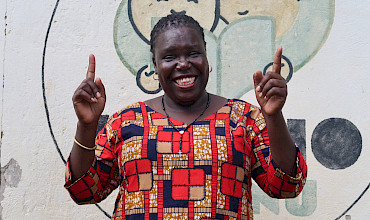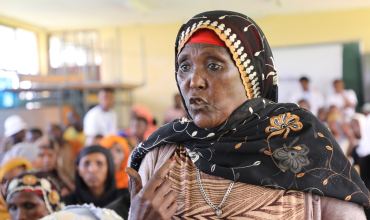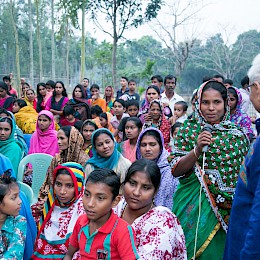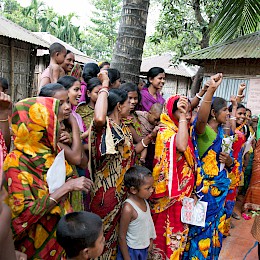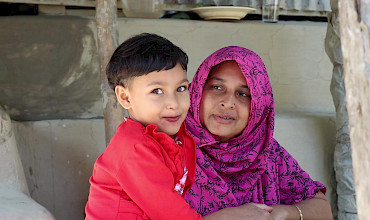
It creates transparency and accountability and is a very powerful tool within the lobby and advocacy strategy of Right2Grow. We are talking about Budget Monitoring and Expenditure Tracking (BMET), which helps communities understand budgets for nutrition and WASH. The tool gives communities the opportunity to shape public spending in line with their needs, thereby supporting children to reach their full potential.
When Mr. Bashir Uddin Gharami speaks at community meetings, he sees the face of his own baby daughter before him. Mister Gharami is renowned as local doctor in the community and has a soft spot for the wellbeing of children, he tells us. For this reason, the work he does as elected General Secretary of a Civil Society Organisation (CSO) in the village of Pyarpur in Bangladesh, gives him a lot of satisfaction. Recently, mister Gharami has participated in a Right2Grow BMET workshop, which helped him to understand and demand more budget allocation for required WASH (water, sanitation and hygiene) and nutrition services for children in his community: “This course enabled me to raise my voice in the presence of government officials. Together with other CSO members we are now jointly working to raise our voices for the rights of children under 5.”
Enhancing budget policy knowledge
In Right2Grow’s journey to zero undernutrition and zero people without access to basic WASH, the voices of communities, CSOs and Community Based Organisation (CBOs) are crucial. They can bring their communities’ challenges to the forefront and help propose solutions. Through training and support, Right2Grow helps these organisations to act as brokers for the voices in their communities, facilitating their active participation in WASH, health, and nutrition-related committees. BMET emerges as an effective tool to bolster community advocacy efforts within Right2Grow. It allows community members to monitor local government budget allocations and track actual expenditures.
BMET is the key expertise of the Centre for Economic Governance and Accountability in Africa (CEGAA), one of Right2Grow’s global partners. For the past two and a half years, in partnership with other organisations from the Right2Grow consortium, CEGAA has worked on promoting BMET by enhancing budget policy knowledge and analytical skills to track financial investments in food and nutrition security and WASH interventions. These skills contribute to effective budget monitoring, expenditure management, and improved service delivery, all while ensuring that sound evidence is generated to influence future decision-making in the public sector.
Engaged communities
BMET focuses on public budgets and spending related to specific local community services. The process starts with a situational analysis and assessment of capacity needs. This aims to identify the service delivery needs of the community and determine the capacity development requirements for CSOs, CBOs, researchers, government officials, and media personnel in topics related to BMET. Next, necessary skills around budget monitoring and expenditure analysis are strengthened among target stakeholders. Communities are then fully engaged in the planning and implementation of research and advocacy activities that follow.
When local doctor Gharami became a Right2Grow advocate, he found it difficult to believe that ‘ordinary people’ could participate in various committees of the Union Parishad (UP: the smallest rural administrative and local government unit in Bangladesh) and raise their voices to demand their rights.
It was unbelievable to me that without political identity people could go to the UP to claim or avail any service.
After several Right2Grow courses on BMET and CSO capacity building on gender, leadership, advocacy and empowerment, he now regularly organises community meetings to discuss different issues like WASH, health and nutrition, mainly focusing on children and young mothers. Moreover, he has been appointed to the standing committees of the UP and actively represented his community in the open budget meeting for the year 2022-23, organised by the UP. Doctor Gharami now has an active voice in the proper expenditure management of the allocated WASH & nutrition budgets for children.
Merely an echo
Silindile Shezi, Project Manager at CEGAA, began working on budget advocacy for the organization in 2009. He has worked in about 12 states in Africa and has seen a huge change on the ground: “Before BMET, budgets were implemented, but people did not feel the impact of those programmes. When we came, we interrogated the systems and highlighted the bottlenecks, such as bureaucratic processes that caused delays in spending and the absence of infrastructure for primary health care.’’ BMET has proven to be a powerful tool for change: ’’In the 14 years that I've been a budget advocate, I've seen a huge change. Before we came, we would see a lot of dissatisfaction and misunderstanding between communities and the government. When BMET is implemented, you can start to see some improvements after three to five years in the government relations with the communities.”
Shezi cites a number of examples: “Governments became more transparent and public participation improved because the community became aware of the possibility to engage. They begin to understand the budgets, and their spending becomes more efficient: eventually they manage to get more out of the same budget. Moreover, it helps the government to re-prioritise and spend the money on the right things, such as better nutrition and WASH for children and pregnant women. And then last but not least, accountability also increases tremendously.''
When there's public participation, there's a big opportunity for improved accountability
Long lasting change
BMET is an essential part of the lobby and advocacy efforts of Right2Grow, Shezi argues: “When you talk about advocacy, you should also talk about government budgets. Policies are merely a promise and mean absolutely nothing when they are not funded. It is the responsibility of civil society to see that the government keeps its promises, making sure that sufficient budgets are allocated. BMET is fundamental, because we can really hold the government accountable and make sure that their promises are indeed implemented and they are making the lives of the people better. Without budget advocacy, we are merely echoing of what is already in the government policies. Now people can approach the government as a proactive discussion partner.”
Local doctor Gharami endorses Shezi's words: “Right2Grow contributed a lot to opening my eyes, changing my beliefs, but also building my capacity and boosting my inner force to work on local level initiatives for long lasting change in vulnerable communities, especially for children.”
In Bangladesh, Right2Grow is working in 40 UPs reaching more than 165,000 people. Through BMET, communities have improved access to WASH and Nutrition, and better mother and childcare. To date, 21 Union parishads increased their annual budgets by 2.6%.
Impact of BMET at a glance
By engaging in BMET, Right2Grow has been able to achieve some impressing results.
Bangladesh
In Bangladesh, Right2Grow is working in 40 Union Parishads (UP), reaching more than 165,000 people. To date, annual budgets of 21 UPs increased by 2.6% resulting in improved access to WASH and Nutrition, and better mother and childcare. Almost all UPs provided food supplements to communities living in poverty, including households with children under 5.
Ethiopia
After being trained on BMET, communities in Ethiopia realised the need to combine policy and budget advocacy to support children under 5 and pregnant women. This led to the preparation of a joint multisectoral nutrition plan with 11 sectors, including budget allocation for 2023.
Burkina Faso
In 2023, local CSOs trained by the Civil Society Network for Nutrition (RESONUT) in budget analysis and monitoring, produced budget statements for their local authorities. Government delegations committed to doubling the allocation of resources to nutrition in their districts, increasing it from 2% to 4%.
Mali
Prior to Right2Grow, the central government in Mali had not constructively engaged civil society in budget planning, implementation and auditing. Hence, it is a huge achievement that partner Groupe de Suivi Budgétaire (GSB) was asked to develop a budget brief on behalf of the government. This signifies an increased level of trust between the government and civil society. The government is now becoming more transparent in disseminating budget information, allowing civil society organisations to monitor recommendations and ensure accountability.
South Sudan
Although at first, implementing BMET seemed challenging due to the socio-policital environment in South Sudan, a joint budgeting workshop was organised with parliamentarians and government officials in 2022 - a rare achievement for civil society. In 2023, Child Rights Civil Society Coalition led the Right2Grow budget advocacy mission to address concerns about low spending on food security, nutrition, and WASH. This resulted in an agreement to enhance budget allocations and spending in these areas.
Uganda
Right2Grow strengthens the ability of local and national government officials to prioritise food security, nutrition, and WASH in their plans and budgets. In 2022, CSOs engaged with the budget committee of the National Parliament, and presented position papers in response to both the National Budget Framework and Ministerial Policy statements, aiming to influence the allocation of national budget resources toward food security, nutrition, and WASH for the upcoming year. Aligning with the advocacy requests of the CSOs, Parliamentary Committees adopted 18 out of the 26 recommendations, showcasing a successful integration of civil society input into the policymaking process.
Back to overview
